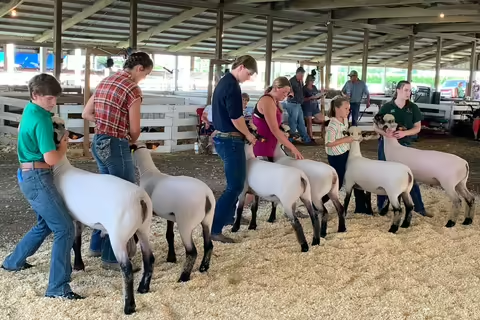Did you know that more than 40% of 4-Hers in the state participate in one or more livestock projects? In fact, four of the top 10 most popular projects in Illinois focus on livestock, including the two most popular projects: swine and beef.
More than 7,000 youth across the state are currently preparing to exhibit their livestock at local 4-H fairs and shows. This includes beef and dairy cattle, pigs, goats, sheep, poultry, and rabbits. Participating in these projects requires lots of hard work and teaches kids skills they can use for a lifetime.
In a livestock project, kids raise and care for an animal daily: doing chores, taking care of grooming and feeding, and ensuring their animal is healthy. They also need to train their animal to be shown in a safe and calm manner, doing things like making sure it’s comfortable around people and noises, and can be led and exhibited. Throughout this process, they frequently need to develop routines, put in early mornings or late nights, and exercise a lot of patience and understanding. They also need to set goals and work toward them. All this work helps teach participants valuable skills like planning, responsibility, perseverance, and decision making. These skills are often touted as ones most often missing in the workforce, but our young people are developing them early.
Another significant aspect of these projects is that kids are learning about the livestock industry and how food gets to their table. This is really important in an age where so many people don’t know where their food comes from, or don’t appreciate all of the work that goes into providing the world with a safe and reliable food supply. Having kids experience first-hand what it takes to raise an animal and follow best quality practices helps them to better understand our food system and appreciate the farmers, ranchers, producers, distributors, and others that make that system function. It also inspires some of these youth to pursue careers in these important industries. In fact, by taking a livestock project in 4-H, members complete industry ethics trainings that ensures they contribute to high quality protein to our food supply.
At 4-H fairs and shows this summer livestock members will exhibit their animals. These animals are generally judged on their overall quality and form, and more specifically on qualities like skeletal structure, muscle development, flexibility, gait, and other breed-specific characteristics. The youth themselves also get judged in showmanship classes on their own poise, knowledge, and ability in the show ring, as well as how well they trained their animal. Through this exhibition and judging, kids practice sportsmanship, develop confidence, and build relationships with other exhibitors, as well as with adult mentors. One of my favorite parts of watching the livestock shows and competitors during the fair season is seeing the youth help each other out in the ring or the show barn. The relationships and social skills that these young people develop through this process can help them succeed in life.
I encourage everyone in the state to come watch our livestock exhibitors show off their projects and skills this summer at your local 4-H fair or show, or at the Illinois State Fair. If your family is interested in possibly participating in a livestock project in the future, these events are a great opportunity to see how these projects culminate each year and meet families that might serve as a future resource. If you’re a local business that sees the value of these livestock projects, consider participating in your local junior livestock sale to help support the youth involved. Best of luck to all our 4-H livestock project members this season as they show off all their hard work! Regardless of the show outcomes, you’ve all set yourself up for future life success just by participating in these valuable projects.
ABOUT THE AUTHOR: Amy Henschen is a 4-H Youth Development Specialist with University of Illinois Extension. She provides statewide 4-H program leadership in the areas of evaluation and staff development. Amy has previously worked as a 4-H educator in both Illinois and Colorado, developing programs to meet local needs. She holds a bachelor’s degree in Communication and Spanish from the University of Dayton and a master’s degree in Agricultural Extension Education from Colorado State University. Amy grew up in the Illinois 4-H program and is passionate about creating high quality programs and environments where youth can thrive.
